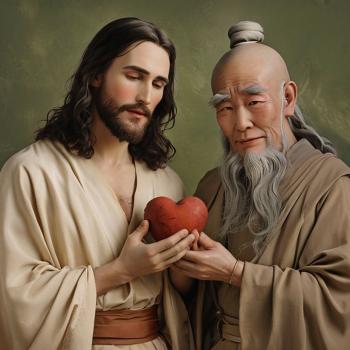Jesus and Lao Tzu warn against good intentions like knowledge, wisdom, charity, and righteousness. They can go awry. Curious? Keep reading…

Even the things that seem like virtues can sidetrack faithful people. Similar to the last verse of Lao Tzu’s writing, verse nineteen addresses people’s inclination to sacrifice the best on the altar of the good.
The sage contrasts the seeming virtues of knowledge and wisdom with the simplicity he invites you to embrace. Next, he places charity, righteousness, and brotherly love over something that doesn’t seem at first to be the opposite—putting others first. Finally, he suggests we exchange profit and greed for desiring little.
Lao Tzu’s Tao Te Ching, Verse 19
J.H. McDonald Version
Forget about knowledge and wisdom,
and people will be a hundred times better off.
Throw away charity and righteousness,
and people will return to brotherly love.
Throw away profit and greed,
and there won’t be any thieves.These three are superficial and aren’t enough
to keep us at the center of the circle, so we must also:Embrace simplicity.
Put others first.
Desire little.
Embrace Simplicity
“Forget about knowledge and wisdom, and people will be a hundred times better off,” says the sage. There’s nothing inherently wrong with knowledge and wisdom. But there is a better way. Embrace simplicity.
Unfortunately, Western society elevates cleverness over clarity, taking us further from the Taoist philosophy of plain truth. Our constant acquisition of knowledge and wisdom is mere chasing after the wind, as these are never satisfied. Once you think you’ve learned it all, suddenly there is more to study. Better to eliminate distraction and understand infinity in the pursuit of zero.
Put Others First
If forgetting knowledge and wisdom is radical, listen to what Lao says next. Throw away the duty of charity and the responsibility of righteousness, and people will still replace it with the doctrine of brotherly love. These things are still too superficial. The Taoist Way of simply putting others first is better than any of these obligations.
On the surface, it might seem that this is synonymous with charity, righteousness, and brotherly love. Yet, these nuanced differences are important. It’s easy to sacrifice the best on the altar of the good, exchanging the higher virtue of putting others first for the lower virtues of charity, righteousness, and brotherly love. So, we must be cautious. Here’s what I mean:
In Lao Tzu’s day, teachers and preachers extolled the virtues of charity and righteousness as civic and religious duty. Sadly, these good things that began as good character often became obligations that eclipsed the simple motive of caring. When we give to charity, we insist on receiving receipts and tax documentation so that we can take a write-off. When we do acts of righteousness, they often become performative so others can see how righteous we are.
Give In Secret
Jesus addressed attitudes like this when he said:
When Jesus said “they have received their reward,” he didn’t mean divine favor. He meant that those who make a show of their generosity have reaped the reward of human admiration. But it’s better to give in secret, Jesus said. Giving is a “yang” activity. It is projective and outward-oriented. But giving in secret is a “yin” activity. When you give, Jesus said, practice subtlety, because in subtlety there is blessing.
Charity and righteousness are lauded as virtues, yet they come with their own baggage of conceit and self-righteousness. Better to simply care about other people and to put them first. Then, you can give without considering who might see your generosity. When the teachers of the law came to Jesus to ask him which was the greatest commandment, no doubt they expected him to tell them which acts of charity and righteousness were most important in the Mosaic law. But Jesus simply said they were to love God and love their fellow human beings. Or, as Lao Tzu simply put it, “Put others first.” This is the better way.
Desire Little
Next, Lao Tzu adjures his followers to replace profit and greed with desiring little. In modern capitalist society, most of us believe profit is a good thing. It drives the wheels of industry, producing individual wealth as well as national prosperity. Yet, captains of industry rarely have the greater good in mind. Most are motivated by appetite more than altruism. The profit margin consumes us, an insatiable desire. No matter how much you earn, you always want more. No matter how much you buy, you can never get enough.
Instead, Jesus told his followers to desire little. “Consider the lilies of the field,” he said. “Consider the birds of the air.” Be content with what you have, knowing that your heavenly Source will care for you.
Choosing the Good Over the Best
As believers, we must be careful not to listen too closely to the well-meaning messages of our leaders who extol virtues such as knowledge and wisdom, profit, charity, and righteousness. These seem like good things, but in focusing on these we may be choosing the good over the best.
Following the Tao is uncomplicated. Often, Taoism is more about forgetting what you’ve been taught than it is about remembering detailed instructions. It’s about simplicity, caring, and contentment. Following these things, you don’t need any detailed dogma or religious rules.
Ponder…
I invite you to take a serious amount of time to look at your budget or bank statements. Ponder the ways you spend, save, and give money. Sometimes, the best way to determine what you value is to look at your finances. How does your spending reflect what’s truly important to you? How does your giving show what you treasure? How does your saving demonstrate your faith?
Nobody should ever tell you what to do with your money. Christianity has seen too many televangelists and pastors who tell their flock to prioritize their ministry over paying family bills. Rather than suggest what you should do with your money, I’ll simply invite you to ponder whether your finances reflect the virtues of simplicity, putting others first, and desiring little. If not, what’s one thing you can do today to reprioritize?
For related reading, check out my other articles…
- How Taoism Made Me a Better Christian
- How are Jesus & Lao Tzu Like Peanut Butter Cups?
- Jesus and Lao Tzu Talk About Eternal Life














